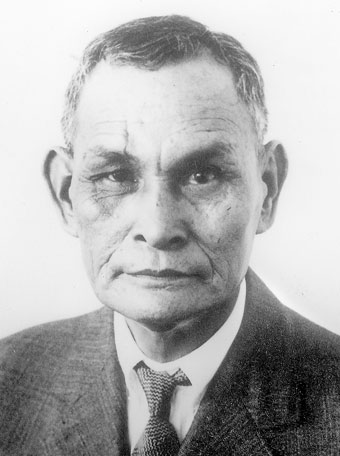For me, the back story is the juicy stuff. I want to know about ingredients and underpinnings -- the stuff that comes before the conclusion. Maybe that's why I've always loved a good obituary.
In this column, I'll be offering "old news" of people and events of the past or not-quite-present, profiling Asian Americans who may not be the most famous or the most influential -- or even the most likable -- but like everyone, have stories of their own.
If you've got a suggestion for someone you want to see profiled, please leave a comment.
Chang Apana
He stood only five feet tall, but he was the toughest guy around.
The father of ten children and husband to three wives, Chang Apana was born in Hawaii in 1871, the son of Chinese immigrants. He and his family returned to China when he was three, but he came back to Hawaii several years later, and remained there for the rest of his life.
At the age of 17 Apana joined up with the Honolulu police department. Before long he was earning awards for his particularly prolific arrest record, often making up to 40 arrests in a single day. Undercover work was his specialty, and he was responsible for breaking up some of the island's most infamous gambling and drug syndicates. The no-nonsense cop’s resume included a record-busting arrest of 70 gamblers in a solo sting operation.
During his 34-year career, Apana was mowed down by a horse carriage, stabbed and even axed multiple times, and hurled out of a second-story building. None of this fazed him. Apana disliked guns and instead insisted on carrying a leather whip -- a throwback to his teenage years as a cowboy. The police department modified its rules to authorize his weapon of choice.
But it was a chance meeting in 1928 that would immortalize Apana, however circumstantially. Author Earl Derr Biggers was vacationing in Waikiki when he became impressed by stories of Apana’s prowess, and decided to use the cop as the basis of his Charlie Chan book and film franchise. Biggers loosely disguised Apana, making the character of Chan sophisticated and slick, while the real-life Apana was more of a self-made tough guy.
Apana died in 1933, at the age of 64. He didn't live long enough to see, or profit from, the string of Charlie Chan movies made in the 1930s and 1940s, in which the starring role of Chan was always played by various white guys in yellowface. (Hmm, sound familar?)
Looks like Apana is finally getting his cinematic due a couple decades too late, though, in the form of this short film starring Cary-Hiroyuki Tagawa.
Old News: Chang Apana
Categories:
Contributor:









Comments